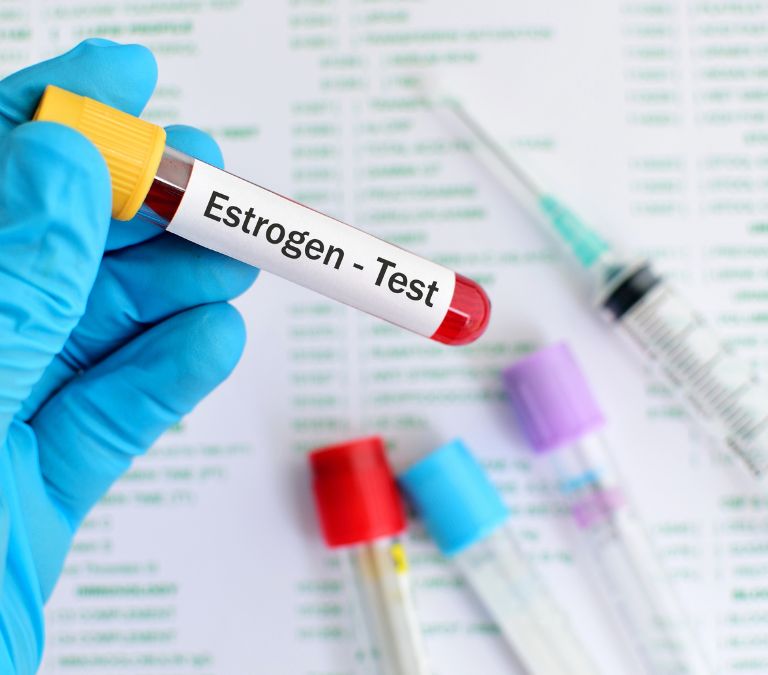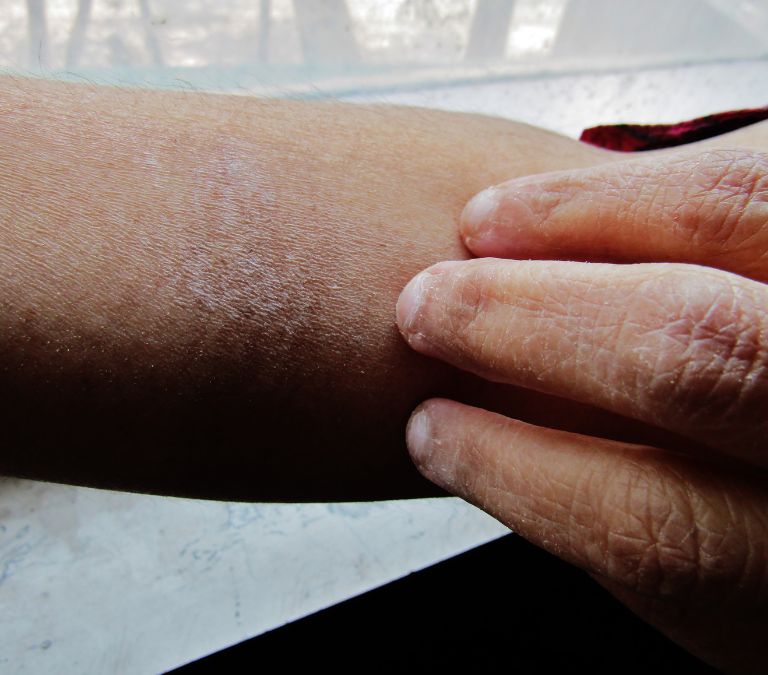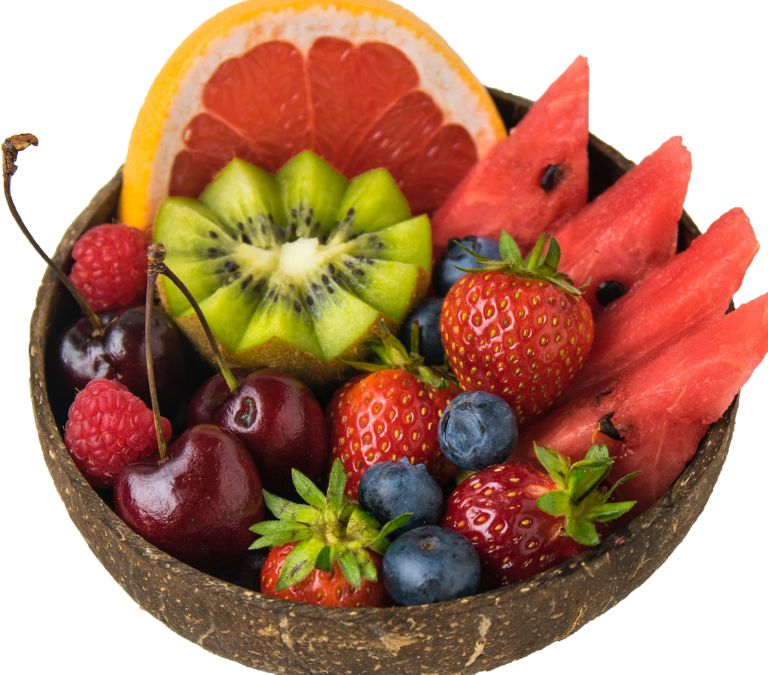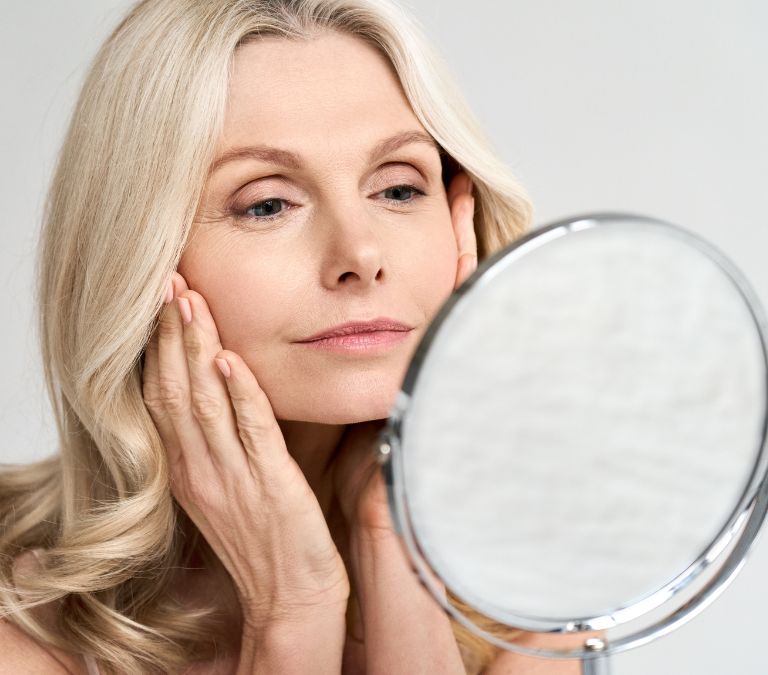Generally, women go to great lengths to care for their skin, and for a good reason, it adds to our beauty. However, during menopause, many women struggle to keep their skin supple and succulent as it is bedeviled by dryness and patches. Are you winning the battle of keeping your skin as fresh as they once were, or are you losing and almost giving up?
The onset of menopause comes with many difficulties. However, with the right information, you can successfully sail through this challenging period with your skin intact.
This article addresses the causes and types of dry skin patches experienced during menopause, and the role fruits play in helping to restore glowing skin during this period.
Decline in Estrogen

The hormone estrogen is quite potent. It facilitates the maturation of a girl’s physique during puberty and contributes to healthy bones. Additionally, estrogen produces lipids and collagen that smooth the skin. As menopause begins and the production of estrogen reduces, the body’s capacity to hold moisture declines resulting in dry, itchy skin.
Due to hormonal changes that affect skin cells’ structure and functionality, menopause can hasten the aging process. This modification can make the skin thinner, less elastic, and less able to heal itself. This phenomenon begins at the forehead and chin and gradually spreads to the chest, back, elbow, legs, genitals, nails, and other body parts.
Types of Skin Problems Associated With Menopause
The following is a list of skin problems women are likely to experience during menopause, as well as their causes:
- Sagging/Wrinkles: This is the loss of skin elasticity around the jawline and neck. During menopause, the body reduces the amount of collagen it produces, resulting in loss of subcutaneous fat, thus negatively affecting skin elasticity.
Also, the production of hyaluronic acid (HA), which draws water to the skin and affects its elasticity, declines during menopause, thereby resulting in visible aging of the skin and sagging.
-
Crows feet: This is also referred to as laughter lines. They are wrinkles that develop in the outside corners of the eyes. Since collagen is produced less frequently during menopause, this results in wrinkles that are noticeable when you grin, frown, or squint.
-
Acne: This is caused by hormonal imbalances in which the body produces excessive androgen or increased sensitivity of androgen at the skin surface. The skin grows dryer and experiences breaks as a result.
Dry skin may worsen acne as it makes it difficult for the lipid bilayer of cell membranes to block microorganisms, which leads to an accumulation of dead cells on the surface. Additionally, the accumulation of such dead cells can trap germs that cause acne breakouts in the body during menopause.
-
Dry Scalp: The hair is kept moisturized and nourished by estrogen, which makes it thick and lustrous. When estrogen levels decrease during menopause, the natural scalp oil production reduces, disrupting the natural pH balance of the hair. The result is a dry, flaky, itchy scalp.
-
Skin Discoloration/Pigmentation: This is caused by a combination of hormone shifts, sunburn, and stress on the liver and is common among women in the final stage of menopause. It is called melasma. It could be around the cheeks, upper lip, or forehead.
Sensitive Skin and Rashes: As skin ages, it grows thinner and becomes more sensitive. Further, it may lose an outer protective layer, making it thinner and more prone to irritation. As a result, some people may become easily irritated by woolen sweaters, fabrics, soaps, or certain beauty products as they get itchy. Others who go out in the sun may realize that they get red, become blotchy, or have prickly heat.
Some may realize that they are considerably more prone to rashes and are more sensitive to fluctuations in temperature. When they suddenly transition from the inside to the outdoors during the summer or vice versa during the winter, they may get pins and needles, heat, or cold bumps on their skin.
-
Dry Vagina: The vaginal tissues become thinner and more sensitive to irritation due to the drop in the body’s estrogen level during menopause. As a result, fewer cells produce moisture in the body, and this causes dryness in the vagina.
- Sunburn: The skin is thinner, so you could generally have more sun-related issues. Although you may take the same precautions as you always have before menopause, if you frequently sun bath, you can find that you burn considerably more quickly. Again, it’s just the result of thin skin that can be more sensitive to sunlight.
- Slow Healing Wounds: Another potential outcome of menopause is that wounds may take longer to heal. You will discover that the healing process takes much longer if one has a cut or bruise.
-
Dry Lips: Estrogen, which helps to maintain skin softness and plumpness, as well as collagen that aids its elasticity, both decline during menopause. Consequently, the skin grows drier and thinner around the face and other body parts. The lips may even be more susceptible to the reduction in moisture because they do not produce moisturizing oil like other skin parts. Thus, they can be badly damaged.
How To Prevent Dry Skin And Associated Problems During Menopause

Menopause-related hormonal changes are the culprit of the dry skin experienced during this stage in women. It may be difficult to completely avoid dry skin. However, by adhering to the following suggestions, this may be reduced.
-
Use a humidifier: A humidifier helps to increase the humidity in the air, thereby helping to keep the skin hydrated and fresh during winter.
-
Choose natural fiber clothing: Cotton and other breathable materials may be great for your skin. However, heavy fabrics like wool or synthetic fabric like polyester can itch your skin more as they scratch it.
-
Use gentle cleanser: Rather than using soap that is abrasive and dry skin faster, use mild and gentle soap on the skin.
Ways To Manage Dry Skin Patches During Menopause
Skin changes caused by menopause do not have to last forever. Various techniques reduce dry, itchy skin and replenish the moisture your skin sorely needs. A few methods are discussed below:
-
Use of lotions and creams: The use of lotions and creams on damp skin helps to moisturize it. After the shower, gently apply a towel to dry the skin, leaving it a little wet. Then, apply moisturizer to lock in moisture.
-
Vaseline® Mature Skin Rejuvenation Healing Moisture Lotion: These are made specifically for women undergoing menopausal changes as it is made to hydrate, soothe, and calm dry, itchy skin. The innovative product, which contains tiny products of Vaseline jelly, hydrates to soothe dry, itchy skin, making it softer and smoother.
-
Avoid hot showers: Do not use hot showers as they dry the skin. Instead, take a quick shower or bath using warm water for only a few minutes to keep the skin hydrated and nourished.
-
Use sunscreen: Always use sunscreen regardless of the weather. Even though the sun may harm the skin during winter, wear a moisturizer with a skin protection factor (SPF) or a broad spectrum sunscreen with an SPF of 30 to 50 to prevent this. Apply sunscreen 30 minutes before venturing outside.
-
Wear Gloves: Because the hands are more exposed to the elements than other body parts, they get drier more quickly. Wearing gloves when outside, especially during winter, protects from the cold and prevents dry skin on the hands. Wear rubber gloves as it helps to keep the hands moist, fresh, and supple.
Further, many have found that natural remedies, such as fruit consumption, have proven invaluable in managing and restoring dry, itchy skin during menopause. Find some helpful suggestions below.
Effects of Fruits on Skin Patches Caused by Menopause

Beyond the lifestyle changes mentioned above, much can be accomplished with the daily intake of fruits. Many consume fruits just because of their sweetness, while others take them to fill their stomach when hungry. However, there is an even greater reason for including fruits in your daily meal, especially during menopause, as it helps the skin maintain its freshness and glow.
Consuming fruits daily gives the body access to various nutrients, important vitamins, and antioxidants that make the skin fresh and glow. During menopause, the body loses a lot of nutrients, hurting the skin. However, fruits’ nutrients, vitamins, and minerals can help combat these losses as they help to synthesize collagen, giving the skin a radiantly healthy and firm appearance.
Fruits also provide the body with a wide range of antioxidants that helps clear out free radicals that cause premature aging. Below is a list of fruits you will want to add to your regular intake as they help improve the skin tone during menopause:
- Apple: Eating apples can help lighten your skin tone and brighten your complexion as they offer a small amount of sun protection. The apple’s collagen and elastin are essential for maintaining youthful skin.
A popular saying is that “an apple a day keeps the doctor away.” There are many benefits from this sweet fruit. Additionally, apple juice will help lighten the skin, make it moist, and help balance its pH.
- Banana: Potassium which is present in bananas, aids in preserving the blood and oxygen supply to the skin cells. It helps increase the blood flow to the skin and makes it fresh and radiant.
Banana is the ideal complement to natural face masks as it contains many potent elements. For instance, it is an excellent exfoliant that helps remove sebum from the skin. Also, it contains vitamins C and E, which supports healthy, clear skin.
Super wrinkle-fighting elements in bananas aid in the fading of age spots and prevent fine lines and wrinkles. Bananas act as fantastic moisturizers and have antioxidant advantages. It is also renowned for having therapeutic effects on the skin, making acne and injury scars less noticeable.
- Papaya: If you want perfect, radiant, and healthy skin, you should incorporate papaya into your regular diet. The papayas’ powerful antioxidants are high in carotenoids and help to combat free radical damage, preserving the smoothness and youth of the skin.
Cold pressed papaya seed oil can help lighten black patches caused by menopausal changes. The tropical papaya fruit, a naturally occurring anti-inflammatory, antimicrobial, and antioxidant, encourages wound healing and cellular regeneration after skin injuries.
Papayas are also rich in carotene, and other important vitamins, including an enzyme, called papain, which helps with digestion and is a key component in several commercial products designed to clear, smoothen and rejuvenate the skin, especially during menopause.
Interestingly, there are many ways to use papaya for skin health, and the fruit’s anti-aging, skin whitening, and moisturizing characteristics are used in a growing industry of beauty products. Papaya skin-supporting carotenoids have strong phyto-protective qualities that can guard the skin against ultraviolet (UV) damage thus maintaining its integrity.
- Mango: The mango fruit is loaded with powerful antioxidants and anti-inflammatory properties that aid in shielding the skin from UV damage. It works well as an ingredient in many skin care products because of its natural healing capabilities.
The mango fruit is a great source of vitamins and minerals and helps to produce collagen, which helps to make the skin firm. It is best for skin prone to early aging, dark spots, and dullness. It contains vitamin A commonly known as retinol which reduces fine wrinkles by promoting the creation of collagen and lightens dark skin areas.
It also contains potassium that helps hydrate skin cells, keeping them moisturized. It contains magnesium which helps to lessen rosacea, acne, and oily skin.
- Pineapple: If a woman undergoing menopausal changes comes down with acne, rashes, and other skin issues, pineapple juice may refresh the skin, making it clear and young. Vitamin C and other antioxidants in pineapple juice have been effective in treating acne, UV damage, and uneven skin toning. Additionally, it will keep the skin hydrated and clear.
These effects are carried out by bromelain without causing further irritability, stinging, drying, or stripping of the skin. By assisting the body to get rid of metabolic wastes from wounds, bromelain has been shown to hasten recovery. By promoting collagen formation and tying to the underlying collagen fibers, it aids in skin reconstruction.
You may age gracefully and gently with pineapple. How? Polyphenols and vitamin C, potent antioxidants that prevent premature aging, are abundant in pineapple juice. They can increase collagen formation, which in turn keeps the skin fresh, elastic, and firm.
- Avocado: Avocado oil is rich in vitamins C and E, plant sterols, omega-9, minerals, and antioxidants. Together, these nutrients can reduce inflammation, increase collagen formation, and remove dead skin cells from the skin’s surface.
Skin that is dry, flaky, and itchy is a typical menopause symptom. Eating fruits that promote good skin, such as avocados, rich in mono-unsaturated fats and vitamin E, will help fight menopausal skin changes from the inside out, thus making facial skin firm and elastic.
Avocado fruit also contains vitamin A, which miraculously affects tired skin and aging. Vitamin A gives the skin a younger and fresher appearance with no discernible fine lines or wrinkles by assisting in the production of new cells and restoring natural collagen.
Additionally, avocados antioxidants help prevent the development of black spots, which can age you and make you feel exhausted. The avocado face mask functions similarly to deep cleansers as it gets deep into your pores and removes dirt, dead skin cells, oils, and other impurities, leaving your skin clean, smooth, and refreshed.
- Orange: Oranges contain high amounts of vitamin C and are naturally moisturizing, so they assist in sealing in moisture, maintaining plump, beautiful skin, preventing the appearance of age spots, and promoting the production of collagen, thereby giving you the skin of your dreams.
Acne can be controlled using orange juice, which has exfoliating qualities that offer a youthful glow and a natural sheen. Apply the juice to the face using cotton wool, leaving the skin supple, fresh, and young.
Vitamin C also aids in expelling toxins from the skin and fighting against illnesses. The orange peel also benefits the body in that its potential antioxidant shields the skin from damage caused by free radicals and removes dandruff from the scalp.
- Watermelon: Watermelon is a wonderful source of vitamin C. It is high in antioxidants and influences collagen formation, which helps to increase skin suppleness. The luscious red part has high water content, which makes it useful in removing dead toxins from the skin.
Numerous essential nutrients are present in the fruit of the watermelon, including vitamins A and C, which are proven to treat and prevent dull, damaged skin. While vitamin A aids the proliferation and repair of damaged skin, vitamin C helps promote the deposition of collagen, which protects the skin from UV damage and reduces wrinkles. While its edible seeds aid in producing collagen, the rind (the green bark) can help reduce inflammation.
- Apricots: High amounts of vitamin A, or retinol, widely used in the skincare industry for its renowned ability to remove fine lines and wrinkles, are found in great quantities in the apricot oil. Continuous retinol usage can delay the onset of aging by battling free radical damage, tightening the skin, and repairing collagen.
Apricots are a great way to moisturize the skin because of their high water content. Improved skin tone, suppleness, and shine are all benefits of apricot oil. Additionally, it nourishes the skin and reduces the visibility of facial wrinkles, fine lines, and blemishes, all of which are made possible by the combined effects of vitamins C and E.
Face scrubs made with apricot kernels encourage the formation of new skin by removing the skin’s top layer of old dead cells. This exfoliating activity removes the damaged cells on the skin’s surface and can aid in lessening fine lines and wrinkles.
The main advantage of apricots is exfoliation, which helps improve uneven skin tone by removing damaged skin. They also stop pigmentation, exposing younger, lighter, and more vibrant skin cells beneath the surface.
Vitamins C and E are two antioxidants well known for their skin-enhancing potential. They reduce the appearance of early wrinkles and increase skin suppleness while shielding skin cells from UV exposure. Another antioxidant that helps shield the skin from sunburns and subsequent UV deterioration is beta-carotene. Due to their high water content, apricots are a great way to hydrate the skin.
- Strawberry: Berries are a fantastic source of flavonoids and antioxidants, which may help prevent wrinkles and fine lines. They are rich in vitamin C, a crucial ingredient in collagen synthesis. This structural protein maintains the skin’s firmness, elasticity, and resilience.
Vitamin C and antioxidants present in this luscious fruit aid in the fight against aging and help to soothe and control breakouts in the skin. With respect to treating skin issues and regenerating the skin, this fruit works wonders. They cure burns, shield the skin against UV radiation, and postpone aging thanks to their potent astringent, anti-inflammatory, and antioxidant effects.
Regularly consuming strawberries results in a radiant complexion. Because they also contain alpha-hydroxy acids, they function as a mild exfoliant that helps remove dead skin cells and slows aging.
Strawberries also contain salicylic acids, which cleanse the pores, deter microorganisms, and help treat acne. In turn, this prevents the breakout of the skin in the future.
Vitamin C in strawberries also aids the production of sebum which balances the amount of oil in the skin. While doing so, it fully nourishes and moisturizes the skin.
Conclusion:
Are you deep in menopause and disturbed about the unappealing state of your skin? Or are you just approaching menopause and bothered by the skin dryness and irritation accompanying it?
No doubt, you are now better informed about the changes taking place within your body and how to manage these. Following the natural and cost-effective skin care advice above can help alleviate your worries as it will help you maintain or restore your glowing, appealing, radiant, and healthy skin even while going through the challenging phase of menopause.







